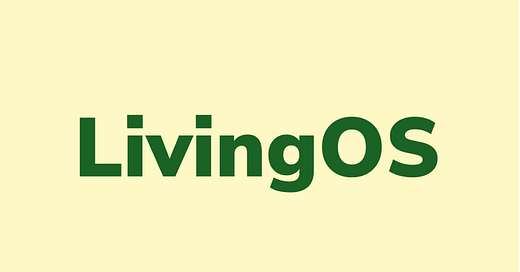📕Weekly Gem - Difficult Conversations
This week I had to let one LivingOS team member go. In the process of making this hard decision, I worked with my leadership coach to understand what it would mean for my team, the person I let go of,
Happy Friday!
This week I had to let one LivingOS team member go. It was a difficult decision because I deeply cared about everyone on the team.
In the process of making this hard decision, I worked with my leadership coach to understand what it would mean for my team, the person I let go of, and myself.
Today I want to follow up with some of the key lessons I learned along the way.
Find Your Team Principles
Team principles unite a diverse team because people can align their behaviors with your expectation. Reference: our team principles.
It helps you decide who is the right fit for your team, instead of relying on your gut feelings. In the past, I have decided to not hire many talented folks because of misaligned principles. However, I have also made the wrong call and hired someone with conflicting interests and principles.
How to Have Difficult Conversations
One of the key principles of LivingOS is transparent communication. This means that I will proactively give feedback to help my team grow. After giving and receiving tons of critical feedback, I want to share some of the lessons with you:
Feedback is a gift: We give feedback because we care and want the person to be better. We care enough to have these hard conversations that are often uncomfortable, so we should be thankful for all the feedback we receive.
Ask for permission: Even though we are doing a favor, we don’t have the right to give feedback without mutual consent. Thus, we should always seek permission or (even better) coach the person to bring up the issue themselves.
Talk at the same level: Once you get the consent, you need to answer questions at the level they were asked. If you give more than what they are asking, you will make them feel inadequate and waste your energy. You want to be mindful of the receiver’s capacity and elegantly adapt to their needs.
Use the 70/30 rule: Let the other person talk 70% of the time. Be curious and listen with curiosity. You want to fully understand their perspectives before you make any judgment. Otherwise, you won’t be able to lead them towards effective changes.
It’s OK to not have an answer: You may not know how to respond to certain comments at the moment, and that’s okay. Don’t feel pressured to flesh out all the details at the moment. Just say “Okay, thanks for sharing that. Let me process it, and let's talk about it later?” One of my decision-making principles is to sleep on all irreversible and significant decisions for 48hrs.
Crucial Conversations have great guidelines on navigating difficult conversations.
Weekly Gem
LivingOS Podcast: This is our favorite episode by far. So proud of Elaine ❤️
Upcoming events: I’m hosting a workshop on empathy and decision-making for Product Buds tomorrow.
See you next week,
Charlene



